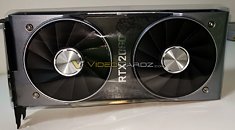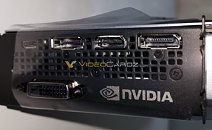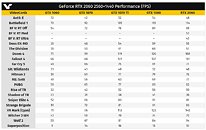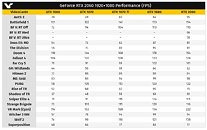Sunday, December 30th 2018

NVIDIA GeForce RTX 2060 Founders Edition Pictured, Tested
Here are some of the first pictures of NVIDIA's upcoming GeForce RTX 2060 Founders Edition graphics card. You'll know from our older report that there could be as many as six variants of the RTX 2060 based on memory size and type. The Founders Edition is based on the top-spec one with 6 GB of GDDR6 memory. The card looks similar in design to the RTX 2070 Founders Edition, which is probably because NVIDIA is reusing the reference-design PCB and cooling solution, minus two of the eight memory chips. The card continues to pull power from a single 8-pin PCIe power connector.
According to VideoCardz, NVIDIA could launch the RTX 2060 on the 15th of January, 2019. It could get an earlier unveiling by CEO Jen-Hsun Huang at NVIDIA's CES 2019 event, slated for January 7th. The top-spec RTX 2060 trim is based on the TU106-300 ASIC, configured with 1,920 CUDA cores, 120 TMUs, 48 ROPs, 240 tensor cores, and 30 RT cores. With an estimated FP32 compute performance of 6.5 TFLOP/s, the card is expected to perform on par with the GTX 1070 Ti from the previous generation in workloads that lack DXR. VideoCardz also posted performance numbers obtained from NVIDIA's Reviewer's Guide, that point to the same possibility.In its Reviewer's Guide document, NVIDIA tested the RTX 2060 Founders Edition on a machine powered by a Core i9-7900X processor and 16 GB of memory. The card was tested at 1920 x 1080 and 2560 x 1440, its target consumer segment. Performance numbers obtained at both resolutions point to the card performing within ±5% of the GTX 1070 Ti (and possibly the RX Vega 56 from the AMD camp). The guide also mentions an SEP pricing of the RTX 2060 6 GB at USD $349.99.
Source:
VideoCardz
According to VideoCardz, NVIDIA could launch the RTX 2060 on the 15th of January, 2019. It could get an earlier unveiling by CEO Jen-Hsun Huang at NVIDIA's CES 2019 event, slated for January 7th. The top-spec RTX 2060 trim is based on the TU106-300 ASIC, configured with 1,920 CUDA cores, 120 TMUs, 48 ROPs, 240 tensor cores, and 30 RT cores. With an estimated FP32 compute performance of 6.5 TFLOP/s, the card is expected to perform on par with the GTX 1070 Ti from the previous generation in workloads that lack DXR. VideoCardz also posted performance numbers obtained from NVIDIA's Reviewer's Guide, that point to the same possibility.In its Reviewer's Guide document, NVIDIA tested the RTX 2060 Founders Edition on a machine powered by a Core i9-7900X processor and 16 GB of memory. The card was tested at 1920 x 1080 and 2560 x 1440, its target consumer segment. Performance numbers obtained at both resolutions point to the card performing within ±5% of the GTX 1070 Ti (and possibly the RX Vega 56 from the AMD camp). The guide also mentions an SEP pricing of the RTX 2060 6 GB at USD $349.99.





234 Comments on NVIDIA GeForce RTX 2060 Founders Edition Pictured, Tested
The performance level suggested in the "leak" puts this close to GTX 1080, and also Vega 64. If this is accurate, and it's priced below Vega 64, it will be a much better buy.
As an added bonus you get functionality that is currently implemented in ONE game and never really makes a difference in its overall experience, and the majority of the Turing product stack hasn't even got enough RT cores to make use of it proper.
As my sources point out, if you read the numbers right, its not even a minor improvement at all. GPU performance increases have grinded to a complete halt at every price point except 1200 bucks. All to facilitate some new feature nobody knows will be vaporware or not in a few years.
Now, the most important part of all this, is what you've just said yourself: its not realistic to keep expecting massive performance jumps ad infinitum. In that vein, isn't it especially strange for Nvidia to spend 30% of the die space not on absolute performance, but on some new feature that only works for a tiny selection of games?
There is only one logic behind all of this, and that is trying to maximize the cashflow generated from already deployed tech. Turing's RT is no more than repurposed Volta technology, and Nvidia just threw it at the gaming wall to see if it sticks. So to me, the only real question here is "Do you want to support that business practice" or not. I don't, because I know that will make future GPUs that much more expensive to make for questionable benefits.I agree. If it provides 1080/V64 perf at 350 (and not the hamstrung bad VRAM/bus choice, shitty chip-version option... yeah that's a lot of caveats Nvidia's built into Turing these days!) then we have an actual perf/dollar improvement. Minor, but present.
We all know however that won't be the case, because the 2070 already takes that spot. So instead of fooling ourselves with some weird, illogical 'leaks' that misrepresent actual performance (as I've pointed out with the 1080ti stock vs 2080 OC examples), let's just get real.
Some are proceeding with the logic that is based on the idea of comparing a 2060 to a 1070, a 1080 to a 2070, a 1080ti to a 2080 and a Titan to a 2080ti.
The rest of us are not doing that. We're comparing a 1060 to a 2060, 1070 to a 2070, a 1080 to a 2080, a 1080ti to a 2080ti and a GTX Titan to an RTX Titan.
We now return you to your normally scheduled conversation..
Compare that to Pascal - we also complained about it, but we all got one. Even under further inflated mining prices.
Techspotuses OC custom gtx 1080(MSI Gaming X ) and TPU GTX 1080 FE, so in that way I trust more tpu it's more apples to apples comparison. That EVGA black review from TPU is stock to stock clocked both review.
The humerous part, to me, is the same people shooting down RT are the same people that propped up AMD and Vulkan pleading to give it time to see the value. While an API and HW are different things, I'm sure the astute are able to see the irony there.
People...we cant have RT without cards being in the market. SOMEONE had to be first...it just happened to be NV. I dont think anyone is buying these cards for RT capabilities now but for performance over last gen. And while it isnt what they were used to (likely due to RT and TC), there are notable differences in each tier (1080ti to 2080 ti, etc). Sure, it isnt what it was, but the price we all pay for innovation. How would we see RT implemented well if not for putting it in the market??
Pricing was a kick in the pants. Because the market adjusted, for better or worse, a lot of these cards are now a no brainer over last gen. It is what it is.
Anyway, looking forward to see facts about performance and pricing on the RTX 2060 and deciding then. 3 pages of this discussion...jeeezus.lol
Edit: the source in the first post doesnt have those results...where are those from?????
So yeah, we all want RTX Titan performance at no more than $250 and great overclockabily. That won’t happen unless there is competition.
I recently looked at the price I paid for my cpu and gpu back when I built my PC in 2011 and I was pretty shocked. 185€ for Intel's top midrange CPU and 170€ for a 560 Ti. Compare that to today's pricing and midrange is considerably more expensive. And then you look over at console pricing and it's a lot more tame. Sometimes it looks like they are trying to kill the desktop market.
Nvidia controls the supply chain very well - that overstock on Pascal cards? It was never an issue, and might have even been a contingency for Turing. They also showed with their FEs that they know exactly what buttons to push to get AIBs to get in line.I like this reading of the whole Turing deal to be honest with you. It all hinges on whether DXR will stick or not. So far I'm not convinced...
Anyway, I hope this also forces AMD to do something as well. But we will wait a while. And I hope prices eventually drop unlike what happened for the last 2 - 3 years.